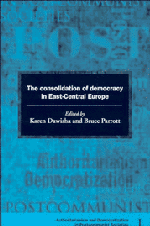Book contents
- Frontmatter
- Contents
- List of tables
- List of contributors
- Preface
- 1 Perspectives on postcommunist democratization
- 2 Democratization and political participation: research concepts and methodologies
- 3 Democratic consolidation in Poland after 1989
- 4 Party politics and political participation in postcommunist Hungary
- 5 Democratization and political participation: the experience of the Czech Republic
- 6 Democratization and political participation in Slovakia
- 7 Democratization and political participation in postcommunist societies: the case of Latvia
- 8 Democratization in Lithuania
- 9 Democratization and political development in Estonia, 1987–96
- Appendix
- Index
4 - Party politics and political participation in postcommunist Hungary
Published online by Cambridge University Press: 01 June 2011
- Frontmatter
- Contents
- List of tables
- List of contributors
- Preface
- 1 Perspectives on postcommunist democratization
- 2 Democratization and political participation: research concepts and methodologies
- 3 Democratic consolidation in Poland after 1989
- 4 Party politics and political participation in postcommunist Hungary
- 5 Democratization and political participation: the experience of the Czech Republic
- 6 Democratization and political participation in Slovakia
- 7 Democratization and political participation in postcommunist societies: the case of Latvia
- 8 Democratization in Lithuania
- 9 Democratization and political development in Estonia, 1987–96
- Appendix
- Index
Summary
The fall of the old regimes in Eastern Europe in 1989–90 was a complex process which in some ways is still unexamined. With few exceptions, most Western postmortem accounts have tended to focus on small groups of visible political actors, founding elections, and the political institutions of the “new democracies.” Data and interpretation of this kind, however valuable, have yet to explain the salience of personalities and events, such as the genesis of the new multiparty system, in a broader analytical framework of socioeconomic continuity and change in the affected countries. At issue are the “long-wave” processes of social mobility and restratification, value change, interest group politics, and macroeconomic transformation that helped define the social, ideological, and economic context of regime change in 1989–90.
It is axiomatic that the key components of postcommunist politics – actors, institutions, and processes – are products not of an areawide democratic parthenogenesis but of antecedent factors. Of these, precommunist traditions and the communist regimes' record of political mobilization, ideological indoctrination, social engineering, and institutional transformation were the most important. Therefore, assessments of postcommunist politics ought to be informed of the combined legacy of “communist universals” (one-party system, patterns of ideological legitimation, command structure, planned economy, and the like) and of indigenous national policy precedents.
- Type
- Chapter
- Information
- The Consolidation of Democracy in East-Central Europe , pp. 109 - 148Publisher: Cambridge University PressPrint publication year: 1997
- 3
- Cited by

